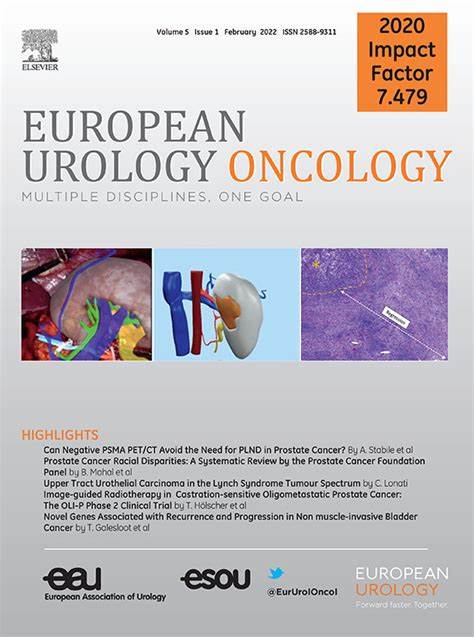Differences in Tumor Gene Expression Profiles Between De Novo Metastatic Castration-sensitive Prostate Cancer and Metastatic Relapse After Prior Localized Therapy
IF 8.3
1区 医学
Q1 ONCOLOGY
引用次数: 0
Abstract
Background and objective
It has been reported that patients with de novo metastatic castration-sensitive prostate cancer (dn-mCSPC) have worse prognosis and outcomes than those whose cancer relapses after prior local therapy (PLT-mCSPC). Our aim was to interrogate and validate underlying differences in tumor gene expression profiles between dn-mCSPC and PLT-mCSPC.
Methods
The inclusion criteria were histologically confirmed prostate adenocarcinoma and the availability of RNA sequencing data for treatment-naïve primary prostate tissue. RNA sequencing was performed by Tempus or Caris Life Sciences, both of which have Clinical Laboratory Improvement Amendments certification. The Tempus cohort was used for interrogation, while the Caris cohort was used for validation. Differential gene expression analysis between the cohorts was conducted using the DEseq2 pipeline. The resulting gene expression profiles were further analyzed using Gene Set Enrichment software to identify pathways with enrichment in each cohort.
Key findings and limitations
Overall, 128 patients were eligible, of whom 78 were in the Tempus cohort (dn-mCSPC 37, PLT-mCSPC 41) and 50 were in the Caris cohort (dn-mCSPC 30, PLT-mCSPC 20). Tumor tissues from patients with dn-mCSPC had higher expression of genes associated with inflammation pathways, while tissues from patients with PLT-mCSPC had higher expression of genes involved in oxidative phosphorylation, fatty acid metabolism, and androgen response pathways.
Conclusions and clinical implications:
Our study revealed upregulation of distinct genomic pathways in dn-mCSPC in comparison to PLT-mCSPC. These hypothesis-generating data could guide personalized therapy for men with prostate cancer and explain different survival outcomes for dn-mCSPC and PLT-mCSPC.
Patient summary
We measured gene expression levels in tumors from patients with metastatic castration-sensitive prostate cancer. In patients with metastatic disease at first diagnosis, inflammatory pathways were upregulated. In patients whose metastasis occurred on relapse after treatment, androgen response pathways were upregulated. These findings could help in personalizing therapy for prostate cancer and explaining differences in survival.
新发转移性阉割敏感性前列腺癌与局部治疗后转移复发的肿瘤基因表达谱差异。
背景和目的:有报道称,新发转移性阉割敏感性前列腺癌(dn-mCSPC)患者的预后和疗效比那些经过局部治疗后复发的前列腺癌患者(PLT-mCSPC)差。我们的目的是研究并验证dn-mCSPC和PLT-mCSPC之间肿瘤基因表达谱的潜在差异:纳入标准:组织学确诊的前列腺腺癌和治疗无效的原发性前列腺组织的RNA测序数据。RNA测序由Tempus或Caris Life Sciences公司进行,这两家公司都获得了临床实验室改进修正案认证。Tempus队列用于询问,Caris队列用于验证。队列间的基因表达差异分析采用 DEseq2 管道进行。使用基因组富集软件对所得基因表达谱进行进一步分析,以确定每个队列中的富集通路:共有 128 例患者符合条件,其中 78 例属于 Tempus 队列(dn-mCSPC 37 例,PLT-mCSPC 41 例),50 例属于 Caris 队列(dn-mCSPC 30 例,PLT-mCSPC 20 例)。dn-mCSPC患者的肿瘤组织中与炎症通路相关的基因表达较高,而PLT-mCSPC患者的肿瘤组织中涉及氧化磷酸化、脂肪酸代谢和雄激素反应通路的基因表达较高:我们的研究揭示了与 PLT-mCSPC 相比,dn-mCSPC 中不同基因组通路的上调。这些假设性数据可指导男性前列腺癌患者的个性化治疗,并解释dn-mCSPC和PLT-mCSPC的不同生存结果。患者摘要:我们测量了转移性阉割敏感性前列腺癌患者肿瘤中的基因表达水平。在初诊时患有转移性疾病的患者中,炎症通路上调。在治疗后复发转移的患者中,雄激素反应通路上调。这些发现有助于对前列腺癌进行个性化治疗,并解释生存率的差异。
本文章由计算机程序翻译,如有差异,请以英文原文为准。
求助全文
约1分钟内获得全文
求助全文
来源期刊

European urology oncology
Multiple-
CiteScore
15.50
自引率
2.40%
发文量
128
审稿时长
20 days
期刊介绍:
Journal Name: European Urology Oncology
Affiliation: Official Journal of the European Association of Urology
Focus:
First official publication of the EAU fully devoted to the study of genitourinary malignancies
Aims to deliver high-quality research
Content:
Includes original articles, opinion piece editorials, and invited reviews
Covers clinical, basic, and translational research
Publication Frequency: Six times a year in electronic format
 求助内容:
求助内容: 应助结果提醒方式:
应助结果提醒方式:


